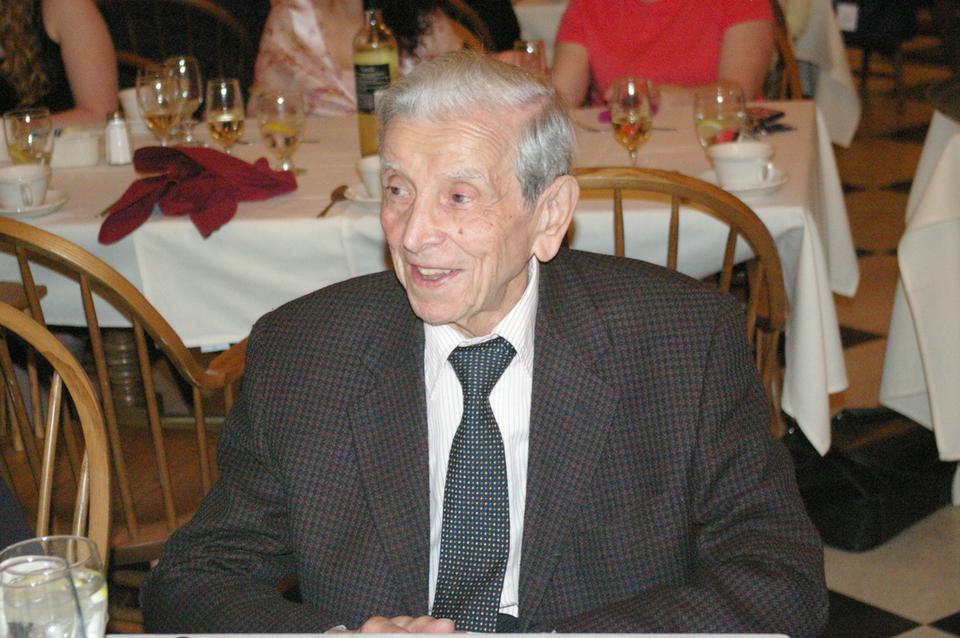
News
Nearly 200 Harvard Affiliates Rally on Widener Steps To Protest Arrest of Columbia Student

News
CPS Will Increase Staffing At Schools Receiving Kennedy-Longfellow Students

News
‘Feels Like Christmas’: Freshmen Revel in Annual Housing Day Festivities

News
Susan Wolf Delivers 2025 Mala Soloman Kamm Lecture in Ethics

News
Harvard Law School Students Pass Referendum Urging University To Divest From Israel
Maurice M. Pechet Remembered as Pre-Med Mentor and Lowell Enthusiast

Maurice M. Pechet, a Lowell House Senior Common Room member for nearly seven decades and a beloved mentor to generations of pre-medical students, died in his sleep on March 5. He was 94.
A celebrated doctor and chemist, Pechet graduated from Harvard Medical School in 1948 and was once considered for a Nobel Prize for his research, according to his wife Kitty Pechet.
“He wanted to find cures for diseases for which there were no known cures,” Kitty said. Pechet’s research on the metabolism of vitamin D led to the development of new treatments for nutrient deficiency. He also helped create prednisone, a widely used steroid, and 5-Fluorouracil, a drug used to combat many kinds of cancer.
Kitty attributed his success in medicine to the resourcefulness he acquired as a child in the “wilds of northern Saskatchewan.”
“His father ran a hardware store. People who needed something had to make it. If you were cold, you had to figure out how to make a stove,” she said. “And it was the figuring things out that allowed him to, I think, contribute to medicine. “
Family and friends remembered Pechet for his meaningful influence far beyond the laboratory or the clinic.
“He was omnipresent,” said Tamin M. L. Pechet ’00, one of Pechet’s four sons who all attended Harvard College and one Harvard graduate school apiece. “He was available and present for commitments to students, the Medical School, his research institute, boards—and yet he was always home for dinner and at my hockey games…. I don’t know where my dad got the time.”
Pechet was also devoted to his other home, Lowell House. He attended Masters’ teas and Senior Common Room lunches weekly and threw dinners at his home for the cast of the Lowell House Opera.
At Commencement each year, Petchet led the Lowell House procession. Two years ago, Lowell House Masters Dorothy A. Austin and Diana L. Eck, worried that the walk would be too tiring, rented him a special rickshaw.
“He dressed in a Harvard tie, looked just fabulous,” Eck said. “Here’s the man, 90 years old, with his baton, stopping traffic.”
Austin remembered, “He would call me up and say—I will miss this voice—‘Dooooorothy, Maurice here. Do you need anything?’”
And he always tried to provide for those needs. “He would show up at the front door sometimes with a case of wine for the SCR,” Eck said. “Or a bottle of sherry which he told me I should have a teaspoon of before going to bed.”
Pechet first came to Harvard to pursue a doctorate in chemistry after a job leading cattle across the plains of Canada. Elliott Perkins ’23, then the Master of Lowell House, offered him a spot as a chemistry tutor.
“He came, like so many students, to Harvard from nowhere, with nothing but his fine mind,” said Kitty, who as Pechet’s wife was the first woman to live in Lowell House. “Basically he came on a one-way ticket.”
Pechet remained a Lowell House affiliate for the rest of his life, at one point serving as senior tutor, the equivalent of today’s resident dean.
The echoes of his zest for life were felt as far away as Russia. After his death last week, the Danilov Monastery in Moscow—which has maintained ties with Lowell since the House returned its historic bells in 2008—sent a fax saying that “‘separation from a kind person with a beautiful soul is a double loss.’”
Pechet offered much-needed advising to students aspiring for medical degrees at a time when the College refused to acknowledge the existence of pre-med students. He offered aid to students in and out of Lowell, according to Eck.
“He always kept up in his field,” said Austin. “He would say to pre-med students, ‘Look, you have to do something in engineering, because this is going to be very important in medicine.’”
Pechet embraced his role as a mentor throughout his many decades as a Lowell House Senior Common Room member.
Xiaolong Zhou ’06—a current medical student at Duke University who came from Durham to attend a memorial gathering for Pechet at Lowell House on Friday—said that Pechet would leave a journal article in his mailbox almost every week. Since Pechet believed students learn best by presenting material to others, Zhou recalled, he would meet Pechet in C-entryway to describe the material from the article to him.
“It was a fantastic way of learning anything from sickle cell anemia to the hormone synthesis pathways,” Zhou said.
Pechet is survived by Kitty and four sons—Tamin, Taine T. V. Pechet ’87, Tavan L. R. Pechet ’93, and Tiron C. M. Pechet ’85.
—Staff writer Radhika Jain can be reached at radhikajain@college.harvard.edu.
Want to keep up with breaking news? Subscribe to our email newsletter.
